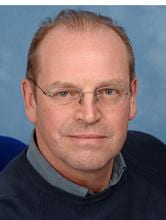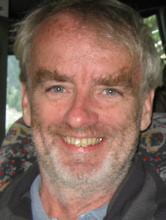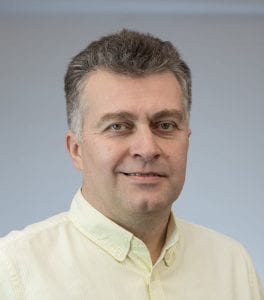Principal Investigator
Prof. Alin Achim received the B.Sc. and M.Sc. degrees in electrical engineering from “Politehnica” University of Bucharest, Romania, in 1995 and 1996, respectively, and a Ph.D. in biomedical engineering from the University of Patras, Greece, in 2003. He then obtained an ERCIM (European Research Consortium for Informatics and Mathematics) postdoctoral fellowship which he spent with the Institute of Information Science and Technologies (ISTI-CNR), Pisa, Italy and with the French National Institute for Research in Computer Science and Control (INRIA), Sophia Antipolis, France. In October 2004 he joined the Department of Electrical & Electronic Engineering at the University of Bristol, U.K., as a Lecturer, he became a Senior Lecturer (Associate Professor) in 2010, and a Reader in Biomedical Image Computing in 2015. From August 2018 he holds the Chair in Computational Imaging at the University of Bristol. He has co-authored over 130 scientific publications, including more than 35 journal papers. Alin’s research interests include statistical signal, image and video processing with particular emphasis on the use of sparse distributions within sparse domains and with applications in both biomedical imaging and remote sensing. He is senior area editor of the IEEE Transactions on Image Processing, an associate editor of the IEEE Transactions on Computational Imaging, and an editorial board member of MDPI’s Remote Sensing. He is also an elected member of the Bio Imaging and Signal Processing Technical Committee of the IEEE Signal Processing Society, an affiliated member (invited) of the same Society’s Signal Processing Theory & Methods Technical Committee and a member of the IEEE Geoscience and Remote Sensing Society’s Image Analysis and Data Fusion Technical Committee.
Co-Investigators
 Prof. David R. Bull holds the Chair in Signal Processing at the University of Bristol. His previous roles include Lecturer with the University of Wales, Cardiff, and Systems Engineer with Rolls Royce. He was the Head of the Electrical and Electronic Engineering Department at the University of Bristol, from 2001 to 2006, and is currently the Director of Bristol Vision Institute. He is also Director of the EPSRC Centre for Doctoral Training in Communications. David’s research addresses challenges in the fields of image and video processing and video communications. He has published some 450 academic papers and articles and has written three books. He has also been awarded two IEE Premiums for his work. David has acted as a consultant for many major companies and organisations across the world, both on research strategy and innovative technologies. He is also regularly invited to advise government and has been a member of DTI Foresight, MoD DSAC, HEFCE REF and EPSRC SAN committees. He was also a member of the Steering Committee for the UK Defence Technology Centre in Data and Information Fusion and is working currently with DSTL on projects related to classifier confidence estimation and computational cameras. David holds many patents, several of which have been exploited commercially. In 2001, he co-founded ProVision Communication Technologies, Ltd., a company specialising in wireless video communications. He was a Director and Chairman until it was acquired by Global Invacom in 2011. David is a chartered engineer, a Fellow of the IET and a Fellow of the IEEE.
Prof. David R. Bull holds the Chair in Signal Processing at the University of Bristol. His previous roles include Lecturer with the University of Wales, Cardiff, and Systems Engineer with Rolls Royce. He was the Head of the Electrical and Electronic Engineering Department at the University of Bristol, from 2001 to 2006, and is currently the Director of Bristol Vision Institute. He is also Director of the EPSRC Centre for Doctoral Training in Communications. David’s research addresses challenges in the fields of image and video processing and video communications. He has published some 450 academic papers and articles and has written three books. He has also been awarded two IEE Premiums for his work. David has acted as a consultant for many major companies and organisations across the world, both on research strategy and innovative technologies. He is also regularly invited to advise government and has been a member of DTI Foresight, MoD DSAC, HEFCE REF and EPSRC SAN committees. He was also a member of the Steering Committee for the UK Defence Technology Centre in Data and Information Fusion and is working currently with DSTL on projects related to classifier confidence estimation and computational cameras. David holds many patents, several of which have been exploited commercially. In 2001, he co-founded ProVision Communication Technologies, Ltd., a company specialising in wireless video communications. He was a Director and Chairman until it was acquired by Global Invacom in 2011. David is a chartered engineer, a Fellow of the IET and a Fellow of the IEEE.
 Prof. John Hogan is Professor of Mathematics in the Faculty of Engineering at the University of Bristol, an established post that he has held for over 22 years. He is renowned for his deep theoretical contributions to problems in capillary-gravity waves. As well as publishing numerous papers of the fundamental properties of these Bragg scatterers, he has also written several reports on the theory of SAR as applied to water waves for the MoD (via subcontractor: OCS Ltd), mainly in connection with submarine detection. He has received numerous awards throughout his career, including an SERC Advanced Fellowship (1990), Doctor Honoris Causa, Faculty of Mechanical Engineering, Budapest University of Technology & Economics, Hungary (2010) and Otto Mønsted Gæsteprofessor at the Danish Technical University in Lyngby, Denmark (2014). In 2011, he was an Invited Plenary Lecturer, 7th International Congress on Industrial & Applied Mathematics (ICIAM) in Vancouver, Canada. Hogan’s research leadership was recognised by the award of two large EPSRC programme grants, worth a total of £2.9M (2002-2011), in which he successfully directed the work of a total of 8 postdocs working with around 20 academics and over 100 visitors. These projects launched many careers and led to around 500 papers, spread across 5 disciplines. Subsequently, Hogan set up the Bristol Centre for Complexity Sciences (BCCS), an EPSRC Centre for Doctoral Training, with interdisciplinary projects in each of the 6 Faculties of the University of Bristol. The BCCS is funded by two additional EPSRC grants worth £7.6M (2006-2018), in which Hogan directs the work of a total of around 60 postgraduate students and 120 supervisors.
Prof. John Hogan is Professor of Mathematics in the Faculty of Engineering at the University of Bristol, an established post that he has held for over 22 years. He is renowned for his deep theoretical contributions to problems in capillary-gravity waves. As well as publishing numerous papers of the fundamental properties of these Bragg scatterers, he has also written several reports on the theory of SAR as applied to water waves for the MoD (via subcontractor: OCS Ltd), mainly in connection with submarine detection. He has received numerous awards throughout his career, including an SERC Advanced Fellowship (1990), Doctor Honoris Causa, Faculty of Mechanical Engineering, Budapest University of Technology & Economics, Hungary (2010) and Otto Mønsted Gæsteprofessor at the Danish Technical University in Lyngby, Denmark (2014). In 2011, he was an Invited Plenary Lecturer, 7th International Congress on Industrial & Applied Mathematics (ICIAM) in Vancouver, Canada. Hogan’s research leadership was recognised by the award of two large EPSRC programme grants, worth a total of £2.9M (2002-2011), in which he successfully directed the work of a total of 8 postdocs working with around 20 academics and over 100 visitors. These projects launched many careers and led to around 500 papers, spread across 5 disciplines. Subsequently, Hogan set up the Bristol Centre for Complexity Sciences (BCCS), an EPSRC Centre for Doctoral Training, with interdisciplinary projects in each of the 6 Faculties of the University of Bristol. The BCCS is funded by two additional EPSRC grants worth £7.6M (2006-2018), in which Hogan directs the work of a total of around 60 postgraduate students and 120 supervisors.


